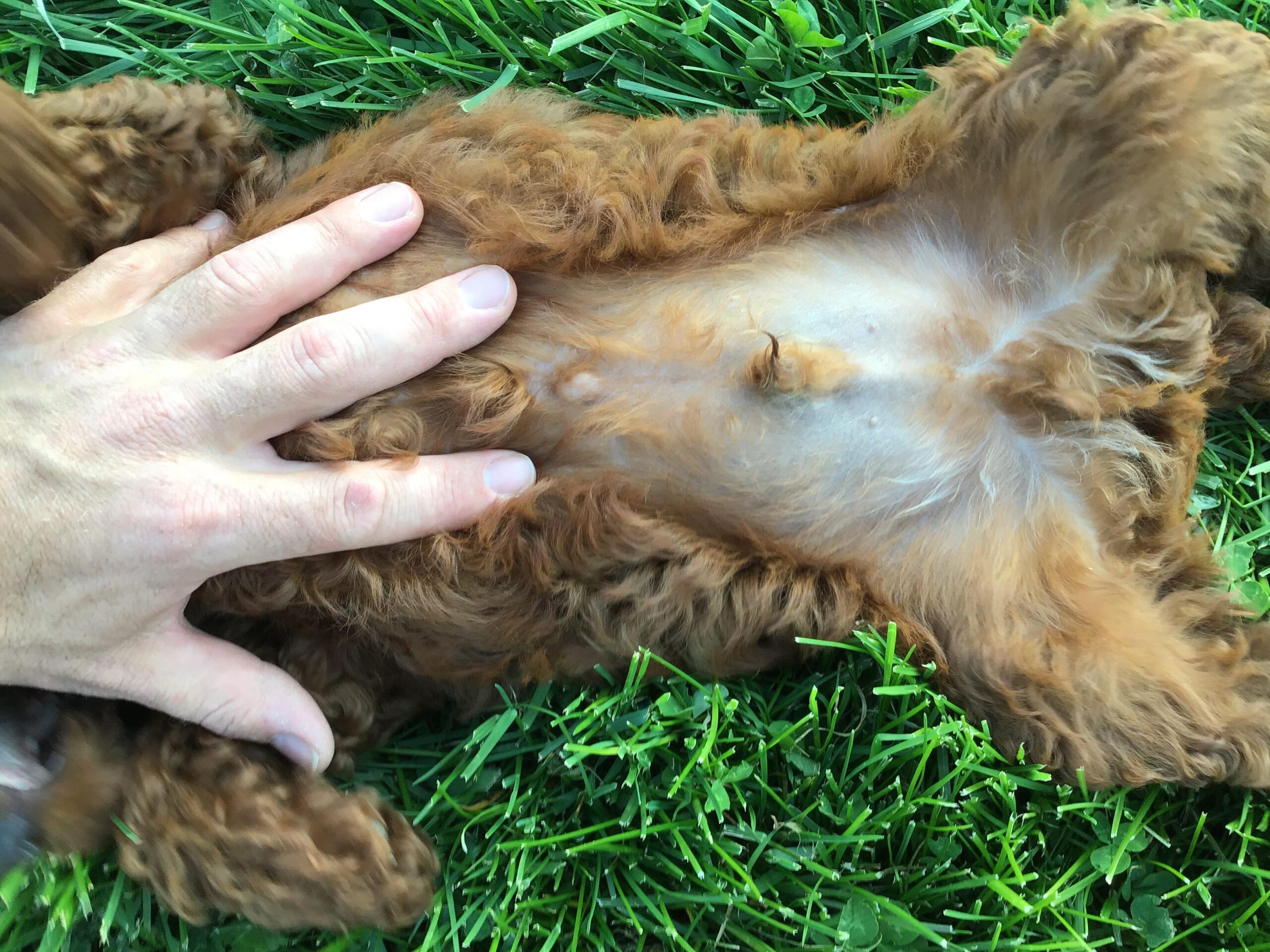Buying a puppy with an umbilical hernia depends on the severity of the condition and the advice of a veterinarian.
Understanding Umbilical Hernia In Puppies
Umbilical hernia is a condition that can sometimes be found in puppies. It occurs when there is an opening or weakness in the abdominal wall near the belly button or umbilicus. If you’re considering buying a puppy with an umbilical hernia, it’s important to understand the condition.
Let’s take a closer look at what an umbilical hernia is, how common it is in puppies, and the causes behind it.
What Is An Umbilical Hernia?
An umbilical hernia is a protrusion of abdominal contents through the muscle wall near the umbilicus. This means that organs, such as the intestines or fat, can push through the weakened area and form a bulge under the skin. It is typically noticed as a small lump or swelling near the puppy’s belly button.
Umbilical hernias can vary in size, ranging from very small to several centimeters in diameter.
How Common Is It In Puppies?
Umbilical hernias are relatively common in puppies, particularly in certain breeds. It is estimated that about 10% of all puppies are born with this condition. Some breeds, such as airedale terriers, bichon frises, boston terriers, and pekingese, are more prone to developing umbilical hernias.
However, it’s important to note that not all puppies with umbilical hernias will require surgical intervention.
Causes Of Umbilical Hernia In Puppies
Umbilical hernias in puppies can have various causes, including:
- Incomplete closure of the umbilical ring during development: In some cases, the opening in the abdominal wall fails to close completely, leading to the formation of an umbilical hernia.
- Genetic predisposition: Some breeds have a higher likelihood of developing umbilical hernias due to inherited traits.
- Increased intra-abdominal pressure: Factors such as obesity, excessive straining, or trauma can increase the pressure within the abdomen, potentially leading to the development of an umbilical hernia.
It’s important to consult with a veterinarian if you notice an umbilical hernia in a puppy you’re considering buying. They can provide guidance on the severity of the hernia and whether it requires surgical correction. Remember, not all umbilical hernias are cause for concern, and in some cases, they may resolve on their own as the puppy grows.
Understanding the basics of an umbilical hernia in puppies will help you make an informed decision about whether to purchase a puppy with this condition. If you’re unsure, it’s always best to seek guidance from a trusted veterinarian to ensure the health and well-being of the puppy.

Pros And Cons Of Buying A Puppy With An Umbilical Hernia
Puppies are undeniably adorable, and the thought of bringing one home can fill your heart with joy. However, before making your final decision, it’s important to consider all the factors that come into play, especially if the puppy you are interested in has an umbilical hernia.
Here’s a look at the advantages and disadvantages of buying a puppy with an umbilical hernia.
Advantages Of Buying A Puppy With An Umbilical Hernia
While an umbilical hernia may initially seem like a downside, there are a few potential benefits to consider:
- Bonding opportunities: Caring for a puppy with an umbilical hernia requires extra attention and care. This can create a unique bonding experience between you and your furry friend, as you provide the necessary support during their recovery.
- Potential cost savings: Puppies with an umbilical hernia are often priced lower than their healthy counterparts. If you’re looking to save some money on the initial purchase, getting a puppy with an umbilical hernia could be a financially viable option.
Disadvantages Of Buying A Puppy With An Umbilical Hernia
While there are advantages, it is important to also take into consideration the potential drawbacks of buying a puppy with an umbilical hernia:
- Health risks: Puppies with an umbilical hernia are more susceptible to certain health concerns. The hernia could lead to complications such as bowel obstructions, which may require surgical intervention. It’s crucial to understand the potential risks involved in order to make an informed decision.
- Potential medical expenses: Treating and managing an umbilical hernia can result in additional medical expenses. Surgical repair is often recommended, and the cost can vary depending on the severity of the hernia and the veterinary clinic. Consider your budget and ability to provide the necessary healthcare for your furry companion.
Buying a puppy with an umbilical hernia comes with its own set of pros and cons. It offers bonding opportunities and potential cost savings, while also posing health risks and potential medical expenses. Carefully evaluate your circumstances, budget, and willingness to provide the necessary care before making your decision.
Remember, your puppy’s well-being should always be your top priority.
Evaluating The Severity And Treatment Options For Umbilical Hernias
Umbilical hernias are common conditions that can occur in puppies. While they might cause concern for potential puppy owners, it’s important to understand the severity of the hernia and the available treatment options. By evaluating the severity and considering the appropriate treatment, you can make an informed decision about whether to buy a puppy with an umbilical hernia.
Let’s explore some key points in differentiating between small and large umbilical hernias, consulting a veterinarian, treatment options, and surgical intervention.
Differentiating Between Small And Large Umbilical Hernias
- Small umbilical hernias are typically less than half an inch in diameter and have a higher likelihood of self-resolution.
- Large umbilical hernias are usually bigger than half an inch and may require surgical intervention.
Consulting A Veterinarian For A Proper Diagnosis
- Schedule a visit to a veterinarian to ensure an accurate diagnosis of the puppy’s umbilical hernia.
- Experts can assess the size, location, and severity of the hernia to determine the most appropriate course of action.
Treatment Options For Umbilical Hernias In Puppies
- Surgical intervention may be recommended for larger hernias that do not resolve on their own.
- Monitoring the hernia’s progress over time may be an option for smaller hernias that show signs of self-resolution.
Surgical Intervention
- Veterinarians might recommend the surgical removal of the hernia to prevent complications and eliminate the risk of hernia recurrence.
- The procedure is typically straightforward and carries minimal risks when performed by a skilled veterinarian.
Monitoring And Potential Self-Resolution
- Smaller umbilical hernias have a greater chance of closing on their own as the puppy grows.
- Regular monitoring by a veterinarian is crucial to ensure that the hernia doesn’t worsen or cause any discomfort to the puppy.
Remember, it’s important to consult with a veterinarian to accurately assess the umbilical hernia’s severity and determine the most suitable treatment option. By keeping a close eye on the hernia’s progress, you can ensure the health and well-being of your puppy.
Factors To Consider Before Buying A Puppy With An Umbilical Hernia
Getting a new puppy can be an exciting and joyful experience. However, if you’re considering buying a puppy with an umbilical hernia, there are a few important factors to consider. Here are some key points to keep in mind:
Assessing The Individual Puppy And Its Overall Health:
- Physical examination: Before making a decision, it’s crucial to have a veterinarian conduct a thorough physical examination of the puppy, including the umbilical hernia. This will help determine the severity of the condition and if any other health issues are present.
- Size and location: The size and location of the hernia can vary. If it is small and easily reducible, it may not pose significant health risks. However, larger or irreducible hernias may require surgical intervention.
- Potential complications: While umbilical hernias are generally harmless and often resolve on their own, complications can arise. These may include infection, trapping of intestines, or obstruction of blood flow. Understanding the risks is crucial in making an informed decision.
Reviewing The Breeder’s Reputation And Commitment To Health:
- Breeders’ responsibility: A reputable breeder should prioritize the health and welfare of their puppies. Research the breeder’s reputation and inquire about their breeding practices, including health screenings and genetic testing. This will help ensure that the puppy comes from a responsible source.
- Ethical considerations: Breeders who knowingly breed puppies with umbilical hernias may be prioritizing profit over the well-being of the animals. Consider whether supporting such practices aligns with your personal values.
- Genetic predisposition: Some breeds may have a higher prevalence of umbilical hernias due to genetic factors. It’s essential to learn about the breed’s predisposition to this condition and discuss it with the breeder.
Considering The Financial Implications Of Potential Medical Expenses:
- Surgical intervention: In some cases, surgical repair may be necessary to correct an umbilical hernia. It’s important to consider the financial aspect of such an intervention, including pre-surgery consultations, the procedure itself, and post-operative care.
- Health insurance: Investigate whether obtaining pet health insurance could help alleviate potential financial burdens associated with the puppy’s medical needs, including any necessary hernia repair.
- Long-term healthcare: While many puppies with umbilical hernias lead healthy lives, it’s important to acknowledge the potential for additional medical conditions in the future. Consider the long-term financial commitment of caring for a potentially higher-risk pet.
Considering these factors will help you make an informed decision about whether to buy a puppy with an umbilical hernia. Remember to prioritize the puppy’s well-being and the responsibilities that come with owning a pet.
FAQ
Can A Puppy Be Born With An Umbilical Hernia?
Yes, it is possible for a puppy to be born with an umbilical hernia. This occurs when the abdominal muscles around the belly button do not close properly, causing a small bulge to form. Most umbilical hernias are harmless and can be easily treated.
What Are The Risks Of Buying A Puppy With An Umbilical Hernia?
While umbilical hernias are generally not a serious health concern, there are risks to consider. If left untreated, the hernia can become larger or potentially cause complications. Surgery to repair the hernia may also be required, which can be an additional expense for the owner.
How Is An Umbilical Hernia In Puppies Treated?
In most cases, an umbilical hernia in puppies will heal naturally without any intervention. However, if the hernia does not close on its own, your veterinarian may recommend surgery to repair it. This is a routine procedure that is typically safe and effective.
Conclusion
Deciding whether to buy a puppy with an umbilical hernia requires careful consideration. While these hernias are a common occurrence in puppies, they can potentially pose health risks if not treated properly. It is crucial to consult with a veterinarian to determine the severity of the hernia and discuss the necessary steps for treatment.
Factors such as the size of the hernia, the age and overall health of the puppy, and the cost and availability of veterinary care should all be taken into account. Ultimately, the decision to buy a puppy with an umbilical hernia should be based on your ability to provide the necessary medical care and attention that the puppy may require.
Remember, the well-being and health of the puppy should always be the top priority.








